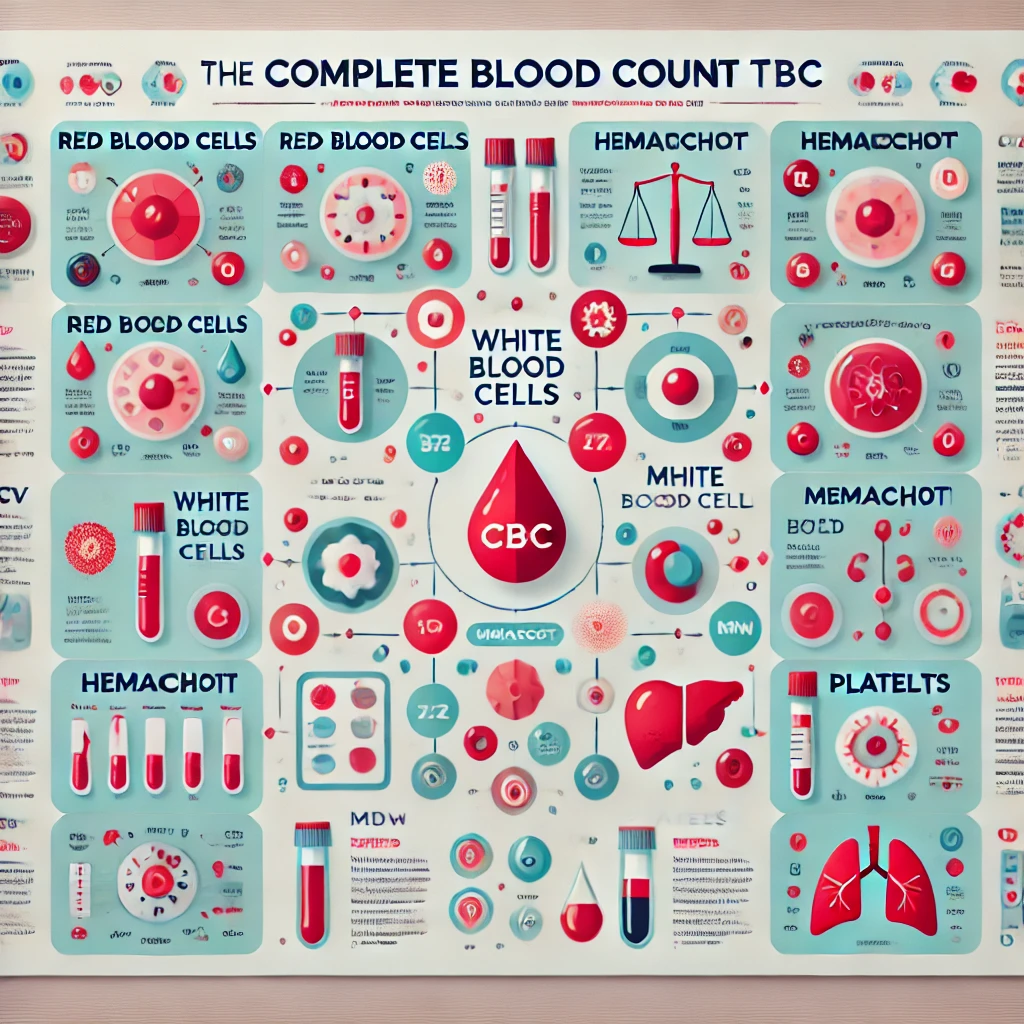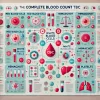
CBC Test – Detailed and Extended Explanation

English Version:
A Complete Blood Count (CBC) is one of the most commonly performed blood tests that provides an in-depth overview of a person’s overall health. It helps doctors and healthcare providers to assess the health of your blood and to detect various health conditions. By measuring different components of your blood, the CBC test provides critical information about the red and white blood cells, platelets, and hemoglobin levels, all of which are essential in understanding your health and identifying potential medical issues.
What Does a CBC Test Measure?
The CBC test measures several components of your blood, and each of these components serves a specific role in your body’s functions:
- Red Blood Cells (RBCs):
- Red blood cells are responsible for transporting oxygen throughout your body. They carry oxygen from your lungs to your organs and tissues and return carbon dioxide back to the lungs to be exhaled. A low RBC count could suggest anemia, blood loss, or nutritional deficiencies. It can also indicate more serious conditions such as bone marrow disorders.
- What it measures: The number of red blood cells in your blood.
- White Blood Cells (WBCs):
- White blood cells are your immune system’s first line of defense. They help fight infections, viruses, and bacteria. If your WBC count is higher than normal, it may indicate an infection or inflammation in the body. Conversely, a low WBC count could suggest a weakened immune system, making you more vulnerable to infections.
- What it measures: The number of white blood cells in your blood.
- Hemoglobin (Hb):
- Hemoglobin is a protein in red blood cells that binds to oxygen and transports it throughout your body. It’s essential for your body’s oxygen-carrying capacity. Low hemoglobin levels may point to anemia, which can result from a variety of factors like iron deficiency, chronic disease, or even genetic disorders like sickle cell anemia.
- What it measures: The amount of hemoglobin in your blood, which is crucial for oxygen delivery.
- Platelets (PLT):
- Platelets are tiny cells that play a critical role in blood clotting. They help prevent excessive bleeding by forming clots at the site of a wound. A low platelet count can result in increased bruising or bleeding, while a high platelet count may indicate a clotting disorder.
- What it measures: The number of platelets in your blood.
- Hematocrit (Hct):
- Hematocrit measures the percentage of your blood made up of red blood cells. This helps assess your blood’s oxygen-carrying capacity. Low hematocrit levels can be an indicator of anemia, while high levels may suggest dehydration or certain types of polycythemia, a condition where there are too many red blood cells.
- What it measures: The percentage of blood that is made up of red blood cells.
- Mean Corpuscular Volume (MCV):
- This is the average size of your red blood cells. It can help determine the type of anemia you might have. Larger than normal red blood cells can indicate vitamin B12 deficiency or folate deficiency, while smaller red blood cells may indicate iron deficiency anemia.
- What it measures: The average size of red blood cells.
- Mean Corpuscular Hemoglobin (MCH):
- This measures the average amount of hemoglobin inside a red blood cell. It helps doctors assess the oxygen-carrying capacity of the cells and can point to specific types of anemia.
- What it measures: The average amount of hemoglobin in a red blood cell.
- Mean Corpuscular Hemoglobin Concentration (MCHC):
- This is a measure of the concentration of hemoglobin in a given volume of red blood cells. It can be used to further investigate the type and cause of anemia.
- What it measures: The concentration of hemoglobin in your red blood cells.
- Red Cell Distribution Width (RDW):
- This measures the variation in the size of your red blood cells. A high RDW can indicate various types of anemia, including iron deficiency anemia.
- What it measures: The variation in size of your red blood cells.
Why is a CBC Test Important?
A CBC test is an essential part of routine health check-ups and helps in the early detection of a variety of health conditions. Here are a few reasons why this test is important:
- Diagnoses Many Conditions: A CBC test can diagnose common conditions such as anemia, infections, and even more severe issues like blood cancers (leukemia) and bone marrow disorders. It is often the first test performed to assess a person’s overall health and to detect potential problems.
- Monitors Health Conditions: If you already have a medical condition like anemia or an infection, a CBC can be used to monitor the progress of your treatment. It helps in tracking changes over time, ensuring that your health is improving or that additional care is needed.
- Prevents Serious Diseases: By identifying abnormalities in your blood count, a CBC test can help detect diseases in their early stages, often before symptoms become severe.
- Helps Assess Organ Function: The CBC test can also provide valuable insights into the overall functioning of organs, including the liver and kidneys, which play a role in blood cell production.
When Should You Get a CBC Test?
It is advisable to get a CBC test regularly as part of your routine health check-up, but there are specific situations where it may be necessary:
- If You Experience Unexplained Symptoms: If you are feeling unusually tired, weak, or fatigued, or if you have a fever or unexplained weight loss, a CBC test can help identify the cause.
- If You Are At Risk of Blood Disorders: If you have a family history of blood disorders or have been diagnosed with a blood-related issue before, it is crucial to get a CBC test periodically.
- If You Are Pregnant: Pregnant women are at a higher risk for conditions like anemia, so getting a CBC test is often part of prenatal care.
- During Regular Health Check-ups: Even if you feel perfectly fine, regular blood tests like a CBC can help detect underlying conditions early.
Conclusion:
The Complete Blood Count (CBC) is an important and informative test that can help you assess your overall health. It provides crucial data about your blood cells, hemoglobin levels, and platelet counts, all of which play a vital role in your body’s function. Whether used for diagnosing a condition, monitoring treatment progress, or simply as a routine check-up, the CBC test is an invaluable tool in maintaining your health.









Add comment